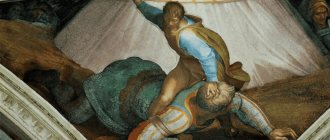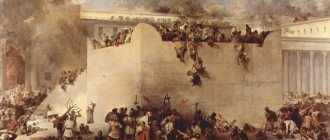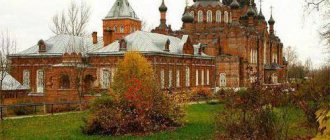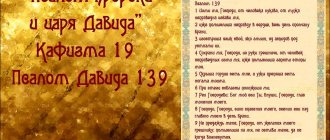Those who regularly attend services know it almost by heart. After all, it sounds during the liturgy, and in the evening when the Six Psalms and special liturgical hymns are read, as if God’s judgment on every human soul.
Briefly about the Psalter
The author of most of the liturgical hymns that the book contains is the greatest of the kings of the Jews, the ancestor of Jesus Christ in the flesh, David. The meekest, most humble, he lived a difficult life, survived persecution - first from King Saul, then from his own son. He wandered more than once, was on the verge of death - but every time he was saved by the Lord. The hymns he wrote are reflections of the human soul about sin, repentance, sorrow over infirmities, joy about forgiveness. They are so consonant with the human soul that for a long time psalms - chants intended for worship - were also sung or read during home prayer.
David cuts off part of Saul's outer robe
In addition, the Psalter, written in the Holy Spirit, is also a prophetic book, containing not only reflections on the human soul, but omens of events at the time of the Incarnation of Christ.
What are psalms
All psalms are written down in a book called the Psalter. Like the prayer book, it is highly revered among Christians. The main difference between psalms and prayers is that they are chanted. In addition, it is necessary to take into account the fact that they all came from the pens of ordinary people. In other words, there is no talk of any divine origin. If some texts of prayers were revealed to people solely by the will of heaven, then the psalms were written by righteous Christians living according to the commandments of God.
Find out what awaits you today - Horoscope for today for all zodiac signs
The most famous author of such texts is King David. It is noteworthy that some psalms were written by him in those years when he was just the anointed of the Lord, but had not yet ascended the throne. This is explained by the fact that David was always distinguished by his love for the Almighty and all His creations. Although, as you know, he himself was not always a righteous man. Some of his psalms were written at a time when he realized the severity of the sin he had committed and turned to heaven with a prayer for mercy and repentance.
Psalm 102, the text of which is very well known to many Christians, is also the creation of King David. It is included by the church in the process of worship, so it can also be heard during liturgies in the church. It is believed that every Christian must read it, since it contains special spiritual energy. According to the clergy, reading the psalm can help one find spiritual balance and draw closer to the Lord.
When and who wrote Psalm 103?
Like most hymns, it was also created by King David - approximately 1000 years before the birth of Christ . Its text has been translated into Slavic since the 9th century, when the saints worked on it. Cyril and Methodius with their students. Thus, the Jewish text of the well-known chant is more than 3000 years old, the Slavic text that is heard now during services is more than 1000 years old.
The circumstances, as well as the exact time of writing the song, have not been established, however, biblical scholars believe that it was written during a time of peace and prosperity in the kingdom of Israel. It, however, prompted St. David’s message is not to relaxation or “resting on one’s laurels,” but to deep gratitude to the Lord for His mercies.
Interpretation of the Psalm
Each psalm contains a specific meaning. Before you start reading the text of the psalm, you need to try to understand what exactly its author wanted to say. In the case of the psalm in question, everything is quite simple. After all, its main meaning is to praise the Almighty:
- David argues that the wrath of the Lord is always just, but it never lasts long. Once a person realizes that he has made a mistake and begins to repent, heaven will grant him forgiveness;
- The power of God is absolute - man cannot even imagine the power of the Creator. After all, it is he who controls the life of every creature living on earth, and also writes the fate of all people;
- the commandments given by the Almighty are a manifestation of care and mercy - one should not perceive the need to live according to the commandments as something unfair. After all, such a righteous life opens the gates of heaven for a Christian.
In addition, the text contains various comparisons. With their help, the author tried to show how great the Lord is. At the same time, he compares a person to flowers that quickly disappear. Thus, David hints that man in himself cannot even compare with the Lord. Because he is just his creation. This comparison is very relevant. After all, the worst sin of a person is pride. David devoted his entire life to learning not to put himself above the Creator. And this is what he tried to teach other people.
Main theme
Step by step, the singer traces how God's grace acts on a person:
- says that the Lord, who created man as a unity of soul and body, is praised not only by the spirit, but also by “the whole interior” of the person praying;
“Exactly! - St. exclaims about this. Ignatius (Brianchaninov), who experienced this state, “With the abundant action of the Jesus Prayer, all the forces of the soul, the body itself, take part in it.”
- according to the word of St. David, the Lord cleanses the sins of a person who repents to Him, heals his illnesses, mental and physical;
- at the same time, all the sins of people are nothing before His mercy: “He did not create for us to eat because of our iniquity; all this is because God treats people the way a parent treats children, accepting them with all their infirmities, as long as the person shows only a desire to change - “as a father generously gives to his sons, the Lord will provide for those who fear Him”;
- His forgiveness is complete, absolute; From now on, man’s “iniquities” are separated from him “as far as the east is from the west,” that is, they do not approach him, just as the west cannot be brought closer to the east, because these are two opposite sides of the world.
Such is the Lord - both for people and for the world of Angels . It is no coincidence that the prophet concludes the chant with the words:
“Bless the Lord, all His angels, you mighty in strength, who do His word, to hear the voice of His words. Bless the Lord, all His might, His servants, who do His will. Bless the Lord, all His works, in every place of His dominion...”
Psalm 102
Psalm No. 102 (with Glory) listen:
KATHISMA 14
| Psalm 102 | Psalm 102 |
| Psalm to David | Psalm of David |
| 1 Bless the Lord, my soul, and all that is within me, bless His holy name. | 1 Bless the Lord, O my soul, and bless all that is within me, His holy name. |
| 2 Bless the Lord, my soul, and do not forget all His rewards, | 2 Bless the Lord, my soul, and do not forget all His benefits. |
| 3 who cleanses all your iniquities, who heals all your diseases, | 3 He forgives all your iniquities, He heals all your diseases; |
| 4 who delivers your life from corruption, who crowns you with mercy and compassion, | 4 He delivers your life from the grave, crowns you with mercy and bounty; |
| 5 who fulfills your good desires: your youth will be renewed like an eagle. | 5 satisfies your desire with good things: your youth is renewed like the eagle. |
| 6 The Lord show mercy and fate to all who are offended. | 6 The Lord brings righteousness and judgment to all who are wronged. |
| 7 He told Moses His ways, He told the children of Israel His desires: | 7 He showed His ways to Moses, and to the children of Israel His works. |
| 8 The Lord is generous and merciful, long-suffering and abounding in mercy. | 8 The Lord is generous and gracious, slow to anger and abounding in mercy: |
| 9 He is not completely angry, he is at enmity forever, | 9 He is not completely angry, and he is not indignant forever. |
| 10 He did not create for us to eat because of our iniquity, but because of our sin he repaid us to eat. | 10 He did not deal with us according to our iniquities, nor did He reward us according to our sins: |
| 11 For as the height of the heavens is from the earth, the Lord established His mercy on those who fear Him. | 11 For as the heavens are high above the earth, so great is the mercy [of the Lord] toward those who fear Him; |
| 12 As far as the east is from the west, he has removed our iniquity from us. | 12 As far as the east is from the west, so has He removed our iniquities from us; |
| 13 As a father gives generously to his sons, the Lord provides generously to those who fear Him. | 13 As a father shows mercy to his sons, so the Lord shows mercy to those who fear Him. |
| 14 Because he knew our creation, I will remember him as the dust of him. | 14 For He knows our composition; He remembers that we are dust. |
| 15 Man, like the grass of his days, like the flower of the field, will blossom, | 15 The days of a man are like grass; like the flower of the field, so it blooms. |
| 16 For a spirit has passed through him, and he is not, and no one knows his place. | 16 The wind passes over him, and he is no more, and his place knows him no more. |
| 17 But the mercy of the Lord is from everlasting to everlasting on those who fear Him, | 17 But the mercy of the Lord is from everlasting to everlasting on those who fear Him, |
| 18 And His righteousness is upon the sons of the sons, who keep His covenant and remember His commandments to do. | 18 And His righteousness is upon the sons of sons, who keep His covenant and remember His commandments to do them. |
| 19 The Lord has prepared His Throne in Heaven, and His Kingdom rules over all. | 19 The Lord has established His throne in the heavens, and His kingdom rules over all. |
| 20 Bless the Lord, all His angels, who are mighty in strength, who do His word, so that they may hear the voice of His words. | 20 Bless the Lord, all His angels, mighty in power, who do His word, obeying the voice of His word; |
| 21 Bless the Lord, all His might, His servants who do His will. | 21 Bless the Lord, all his armies, all his servants, who do his will; |
| 22 Bless the Lord, all His works, in every place of His dominion; bless the Lord, O my soul. | 22 Bless the Lord, all His works, in all the places of His dominion. Bless the Lord, my soul! |
Glory:
Share:
Peculiarities
Together with the next psalm 103, dedicated to the action of God’s providence among the elements of the material world, nature, wisely created by the Creator, 102 is called “paired,” since the two hymns complement each other in meaning and content. In total, there are six “paired” chants united by a common idea in the Psalter.
King David
In addition, the text of the chant contains some expressions that are difficult to understand for modern people. So, for example, it says here that thanks to Grace “your youth will be renewed like an eagle . During the time of St. David it was believed that:
- the eagle is the only bird that flies to the very sun;
- many believed that the luminary renews him, restoring his youth.
This is exactly how the words of the prophet should be understood: we are talking about spiritual renewal, the new life of the believer, which he receives from God.
Interpretation of Christian Psalm 102 for Orthodox believers
Comment 1
In all canonical Bibles: Hebrew, Latin and Orthodox, the texts of Psalms 102 and 103 are called pairs, since their meaning consistently complements each other. Both were written by the psalmist and King David, and although the exact time of their composition cannot be determined, the sublime content of the psalms suggests that their lines were written during one of the quiet periods of his life. The text of Psalm 103 is a solemn hymn praising God and listing His mercies and bounties.
Orthodox Psalm 102 to help a sick person
The Orthodox text of Christian Psalm 102 is well known to every believer: it is sung every Sunday at the beginning of the Divine Liturgy. This is not surprising: perhaps there are no other songs in the psalter so imbued with a festive and solemn mood. The author of Psalm 102 calls on everyone living both on earth and in heaven (Angels) to praise and bless the Lord, remembering His greatness and the eternity and transience of their own lives - this makes the hymn truly touching and joyful. It is customary in Orthodoxy to read and listen to Psalm 102 about people suffering from a variety of diseases, so that God will heal them.
Listen to the video of the Orthodox prayer Psalm 102 in Russian
Read the Orthodox text of the prayer Psalm 103 in Russian
Bless the Lord, my soul, and my whole being is His holy name. Bless the Lord, my soul, and do not forget all His benefits. He forgives all your iniquities, He heals all your illnesses; delivers your life from the grave, crowns you with mercy and bounties; satisfies your desire with good things: your youth is renewed like an eagle. The Lord brings righteousness and judgment to all who are offended. He showed His ways to Moses, and to the children of Israel His works. The Lord is generous and merciful, long-suffering and abounding in mercy: he is not completely angry, and is not forever indignant. He did not deal with us according to our iniquities, nor did He reward us according to our sins: for as the heavens are high above the earth, so great is the mercy of the Lord toward those who fear Him; As far as the east is from the west, so He has removed our iniquities from us; As a father has mercy on his sons, so the Lord has mercy on those who fear Him. For He knows our composition, He remembers that we are dust. Man's days are like grass; like the flower of the field, so it blooms. The wind passes over him, and he is no more, and his place no longer recognizes him. But the mercy of the Lord is from everlasting to everlasting to those who fear Him, and His righteousness is upon the sons of sons, who keep His covenant and remember His commandments to do them. The Lord has set His throne in heaven, and His kingdom rules over all. Bless the Lord, all His angels, mighty in power, who do His word, obeying the voice of His word; Bless the Lord, all His armies, His servants, who do His will; Bless the Lord, all His works, in all the places of His dominion. Bless the Lord, my soul!
Orthodox Psalter, text of Psalm 103 in Church Slavonic
Bless, my soul, the Lord, and all that is within me, His holy name; bless the Lord, my soul, and do not forget all his rewards; cleansing all your iniquities, healing all your ailments, delivering your belly from corruption, crowning you with mercy and bounties, fulfilling your good desires; Your youth will be renewed like an eagle. The Lord grant alms and justice to all those who are offended. Moses told his ways, the sons of Israel their desires. The Lord is generous and merciful, long-suffering and abounding in mercy. He is not completely angry, he is at enmity forever; He did not create food for us because of our iniquity, nor did He reward us with food because of our sin. As the height of heaven from the earth, the Lord established his mercy on those who fear him; The east is far removed from the west, and our iniquities have been removed from us. As a father gives generously to his sons, the Lord will provide for those who fear him. For the knowledge of our creation, I will remember, as for the dust of Esma. A man, like the grass of his day, like a spring flower, will bloom; for a spirit has passed through it, and is not there, and no one knows its place. The mercy of the Lord is from everlasting to everlasting on those who fear him, and his righteousness is on the sons of sons, who keep his covenant and remember his commandments to do it. The Lord has prepared His throne in heaven, and His kingdom possesses all. Bless the Lord, all his angels, who are mighty in strength and do his word, to hear the voice of his words. Bless the Lord, all his might, his servants who do his will. Bless the Lord, all his works in every place of his dominion; bless the Lord, my soul.
Brief interpretation
The Holy Fathers see at least several meanings in this hymn:
- literal-historical; after all, the chant was written as gratitude to St. David for God's many blessings;
- prophetic, dating back to the time of the deliverance of the Jews from Babylonian captivity - about 500 years after David; This is noted, for example, by St. Theodoret of Cyrus, who understands the words “delivering your belly from corruption” in exactly this way;
- finally, the words of the hymn refer to the Christian life; for example, the expression “crowning you with mercy and bounties” is understood by the holy fathers as a proclamation of the coming of the Messiah, when a person will be freed from sin and given mercy.
In what cases is it read?
The 102nd is part of the 14th kathisma (part) of the Psalter. It begins with the penitential Psalm 101, called “the prayer of the poor, when he becomes discouraged and pours out his prayer before the Lord,” and continues with hymns praising the Creator, hymns of thanksgiving, praising Him for having mercy on people.
That is why it is useful to read the entire kathisma during times of despondency and thoughts of lack of faith.
Separately, the 102nd is read, wanting to thank the Lord, or to try to better understand what mercies He pours out to the human soul. It is also useful to read it together with the “paired” 103rd, praising the beauty of God’s world.
On the index of the psalms of St. Arsenius of Cappadocia
The saint lived at the turn of the 19th and 20th centuries. in the region of Cappadocia, which gave the world many saints of God: St. Basil the Great, Gregory the Theologian, Gregory of Nyssa. And the Venerable himself Arseny baptized the future saint of God, also Arseny, in monasticism - Paisius, now the illustrious elder Paisius of the Holy Mountain .
Index compiled by Rev. Arseny to the Psalter - in fact, a short commentary on each of its 150 hymns, advice on when it is appropriate for a believer to read each of them. For the 102nd, this very unexpected instruction is given here: read, “may the Lord help the woman suffering from female infirmity.”
This approach causes different assessments, and others are very confused by the fact that, as the publishers of this work write, St. Arseny, “the psalmist did not put into the psalms those thoughts and petitions that St. Petersburg indicates. Arseny."
For example, priest Georgy Belodurov writes about this in one of the Orthodox forums on September 11, 2005
“This list seems largely ridiculous to me. Especially if you take it together. However, the elders also had eccentricities. Which should not be a reason for any insinuations against them.”
On the other hand, many Christians are grateful to St. Arseny for such instructions, allowing them to find a chant that corresponds to their state of mind. In a word, whether to read the Psalter according to the recommendations of the saint, everyone decides in relation to their circumstances.
Many who read the hymns of King David know from experience that they, written by man, are in fact the creation of two, the saint and the Spirit of God. That is why the depth of these words is so great, almost inexhaustible, and you want to read it again and again. .
Natalia Sazonova
Contents of the Psalm
Judging by the test of Psalm 103, it is somewhat different from the others. Because in it David exclusively praises the Most High, His greatness. Comparing this text with others, one important detail becomes obvious: when writing it, the author was completely calm. This suggests that the author wrote the text during his peaceful reign.
As you know, the ruler lived for many years with several wives. Simply put, he had a whole harem. In those years, this was not considered something strange for rulers. But still, many priests reproached the king for categorically refusing to dissolve the harem. And there was a good reason for this. David's children were at enmity with each other. Each of them dreamed of taking the throne of their father.
This circumstance greatly darkened David’s life. After all, he was actually very attached to his children. Proof of this is his reverent attitude towards his son named Absalom. It was this youth who betrayed him first.
The young man, who enjoyed authority among the courtiers and was also a favorite of the common people, rebelled against his father. Because of this, David was forced to leave Israel and wander with his loyal soldiers. Returning to his country, David managed to suppress the uprising and regain power. He forgave his son and gave the order to the soldiers to return him to the castle. However, Absalom, fearing his father's wrath, fled. He died during the escape. The news of the death of his son came as a strong blow to the ruler.
Returning to the discussion of the text of Psalm 102, it should be noted that there is absolutely no hint of the author’s mental suffering. That is why church ministers are also inclined to believe that it was written in times of peace, when the ruler had a rare opportunity to talk about the meaning of life and the greatness of the Lord. That is, if we answer the question why this psalm is read, then we can say that it is to calm the soul and glorify the power of the Almighty.
If we rely on historical facts, then a time of peace came to Israel already at the dawn of David’s reign. From this it follows that Psalm 102 could have been written by the king in his old age. That is, answering the question why this psalm is read, we can say that to calm the soul and glorify the power of the Almighty.
Prayer
Bless, my soul, the Lord, and all that is within me, His holy name:
bless, my soul, the Lord, and do not forget all His rewards:
cleansing all your iniquities, healing all your illnesses,
who delivers your life from decay, who crowns you with mercy and bounties,
who fulfills your good desires: your youth will be renewed like an eagle.
Show mercy to the Lord and the destiny of all those who are offended.
He told Moses His ways, His desires to the sons of Israel.
The Lord is generous and merciful, long-suffering and abundantly merciful.
He is not completely angry, but he is at enmity forever:
It was not because of our iniquity that He created for us to eat, but because of our sins He rewarded us with food.
As the height of the heavens from the earth, the Lord established His mercy on those who fear Him:
The east is far from the west, and has removed our iniquity from us.
Just as a father gives generously to his sons, the Lord will provide for those who fear Him.
As He knew our creation, I will remember, as I am the finger.
A man, like the grass of his day, like the wildflower, will bloom like this:
for the spirit has passed through him, and is not, and no one knows his place.
But the mercy of the Lord is from everlasting to everlasting on those who fear Him,
and His righteousness is upon the sons of sons, who keep His covenant and remember His commandments to do.
The Lord has prepared His throne in heaven, and His kingdom rules over all.
Bless the Lord, all His angels, mighty in strength, who do His word, that they may hear the voice of His word.
Bless the Lord, all His might, His servants, who do His will.
Bless the Lord, all His works in every place of His dominion: bless the Lord, O my soul.







